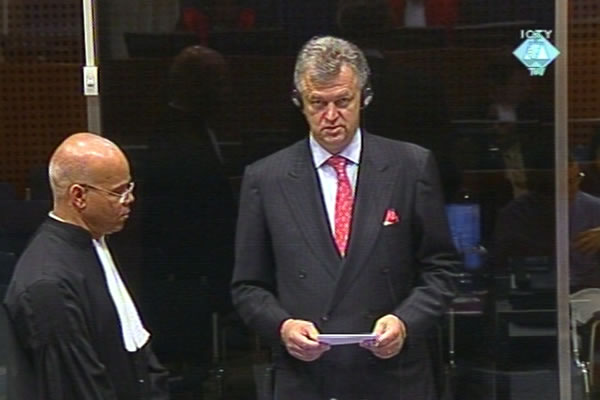Home
LINGUISTICS AT THE BRIJUNI MEETING
In his evidence in the defense of Ante Gotovina, former Croatian foreign minister Miomir Zuzul has argued that Croatia respected the human rights of Serb civilians during and after Operation Storm. Zuzul has offered an original linguistic interpretation of Tudjman’s words that the Serbs "should be provided with a route to leave, while we would pretend to guarantee their civil rights"
 Miomir Žužul, svjedok odbrane Ante Gotovine
Miomir Žužul, svjedok odbrane Ante Gotovine Former Croatian foreign minister Miomir Zuzul contends that Croatia headed by President Tudjman ‘strongly supported’ a peaceful solution for the conflict in the former Yugoslavia. According to Zuzul, military operations were launched only when all other options were exhausted, never without the support of the USA and ‘friendly’ European countries. In Zuzul’s opinion, this was the case with Operation Storm, launched in the summer 1995. As alleged by the indictment against generals Gotovina, Cermak and Markac, a number of crimes against Krajina Serbs were committed in the course of the operation.
In the period relevant for the indictment Zuzul was Croatia’s ambassador in the UN in Geneva and acted as Tudjman’s envoy at the negotiations with the international mediators. In his evidence as Ante Gotovina’s defense witness, Zuzul said that Croatia had the ‘understanding’ of the USA: if the Geneva talks should fail, it could launch a military attack against the so-called Republic of Serbian Krajina. The decision to launch Operation Storm was reached in the evening of 3 August 1995, when the news came in from Geneva that the Serbian delegation had rejected the Z4 peace plan. Had Washington asked that the operation be stopped, Zuzul contends, Tudjman would surely have done so; this is what he did some time later when the HV and the BH Army advance towards Banja Luka was stopped at the behest of the US.
The witness is sure Tudjman would never have opted for a military solution without the understanding of the US. However, their support came with a number of conditions: the operation was to be carried out quickly and that the safety of Serb civilians and international monitors in the field had to be ensured. As the prosecution alleges, the transcripts from the meeting of the Croatian political, military and police leadership in Brijuni on 31 July 1995 showed that Croatia was trying to create an impression it was taking care of the civilians, but behind it was its intent to permanently eliminate Serbs from Krajina. According to the prosecution, this can be clearly seen in a sentence defense counsel Kehoe showed to Zuzul today.
‘Serbs should be provided with a route to leave, while we would pretend to guarantee their civil rights’, Franjo Tudjman said. He wanted the leaflets to be distributed, with the clearly marked corridor left open by the HV for the civilians to withdraw towards Serbia. As Miomir Zuzul explained, it was a case of ‘linguistic misunderstanding’ concerning the word ‘pretend’. President Tudjman, Zuzul said, used a rare Croatian expression whenever he talked about ‘some concepts he knew of, but didn’t believe in them’, such as ‘(pretended) freedom of the press’ or ‘(pretended) human rights’. This is why, Zuzul claims, this word should be translated into English as ‘so-called’ and not ‘pretend’ as in the Tribunal’s translation of the presidential transcripts.
Miomir Zuzul gave evidence before the Tribunal in May 2008 in the case against six former Herceg Bosna leaders as defense witness of the first-accused Jadranko Prlic. Zuzul claimed then that in the spring of 1993 Alija Izetbegovic offered Tudjman to annex Western Herzegovina to Croatia.
As the hearing today drew to a close, the prosecution began cross-examining the former Croatian diplomat.
Linked Reports
- Case : Gotovina et al. - "Operation Storm"
- 2009-06-05 TUDJMAN: ‘THERE MUST BE NO MORE THAN 10 PERCENT SERBS LEFT IN KRAJINA’
- 2009-06-04 WITNESS: LOOTING AND ARSON IN KRAJINA ANGERED TUDJMAN
- 2009-06-03 WHO SCARED THE SERBS WITH PROPAGANDA?
- 2009-06-09 WHAT MADE TUDJMAN ‘CHUCKLE’
- 2009-06-12 IMMUNITY FOR GOTOVINA'S INVESTIGATOR
- 2009-06-17 MRKSIC BEGINS HIS EVIDENCE AS GOTOVINA’S DEFENSE WITNESS
